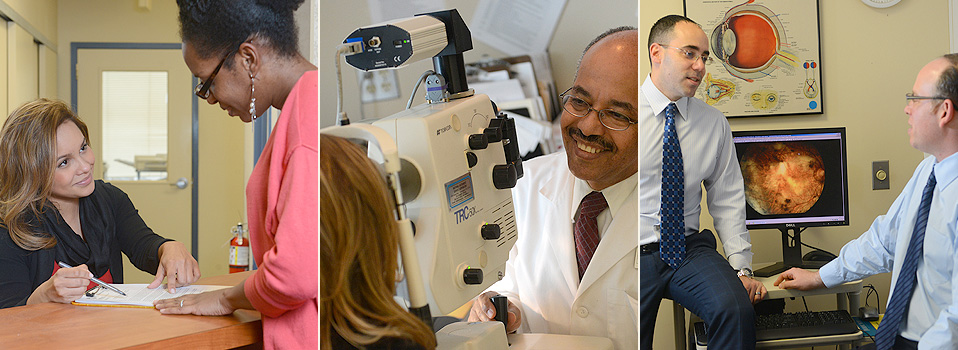Services

About Us
At Retina Consultants, we specialize in the medical and surgical treatment and management of all systemic types of vitreo-retinal diseases. All of our physicians are Board Certified and Fellowship-trained medical and surgical retina specialists and/or uveitis experts. Also, our physicians hold teaching appointments at several academic hospitals in the area, publish scholarly articles in well-known medical journals, present papers at scientific meetings and give lectures to community groups—all activities that help keep our physicians at the forefront of the latest scientific research and advances in technology, which translates to top-notch treatment and services for our patients. Some of the vitreo-retinal diseases that we specialize in diagnosing and treating are:
- Retinal tears and detachments
- Vitreous detachment
- Diabetic retinopathy
- Macular hole, macular pucker
- Age-related macular degeneration
We also have a knowledgeable office staff who is committed to supporting our patients in multiple ways. They strive to maintain an orderly and friendly office environment, ensure that appointment and surgery scheduling run smoothly and efficiently and respond to patients’ questions or direct them to find the best answer. Our patients’ health, comfort and satisfaction of care is their primary concern.
HILARY SCHWAB PHOTOGRAPHY
Why Visit a Retina Specialist?
Because many eye diseases that cause vision loss involve the retina, and the retina is responsible for all vision. Whether vision problems arise from localized eye disorders or manifestations of systemic diseases, like diabetes and hypertension, the retina is affected. Discovering where and how the retina is being affected by disease is essential to making an accurate diagnosis, which in turn influences the creation of an effective treatment plan. At Retina Consultants, we will conduct a thorough examination of your eyes, using state-of-the-art diagnostic equipment, your eye and physical health history and your family health history, to diagnose your vision problem(s). Based on this, we will work closely with you to create a personalized treatment plan that fits your needs and lifestyle. Some of the diagnostic tests that we conduct in our office are:
Diagnostic Tests
FLUORESCEIN ANGIOGRAPHY OR ICG ANGIOGRAPHY
These are diagnostic procedures in which a high-resolution camera takes a rapid sequence of photographs that a computer then analyzes to document the blood circulation of the retina/choroid. Part of this procedure also typically includes injecting dye into a vein in the arm, forearm or hand. These procedures help to diagnosis and guide treatment of macular degeneration. Retina specialists also use fluorescein angiography to diagnosis diabetic retinopathy, hypertensive retinopathy and other vascular and chorioretinal diseases.
OPTICAL COHERENCE TOMOGRAPHY
This procedure measures the thickness of the retina at the micron level. By obtaining optical scans of a cross-section of the retina, our physicians are able to identify and diagnose many types of retinal abnormalities, including age-related macular degeneration, cystoid macular edema, diabetic macular edema, macular traction syndrome, macular holes and surface wrinkling retinopathy.
VISUAL FIELD TESTING
This test, which measures the eye’s complete span of peripheral vision while focused on a central point, detects the loss of peripheral vision and provides a map of that loss, which helps diagnose the cause. A brain tumor; stroke in the brain; vascular diseases in the eye (such as retinal vein/artery occlusion) and optic nerve damage (due to glaucoma), retina damage (caused by detachment) and macular degeneration are some of the diseases that may be detected with the visual field test.
OCULAR ULTRASOUND
Ocular ultrasound imaging is useful when the view into the eye is obstructed by cataract, hemorrhage or other opacities. It is also useful in the diagnosis of ocular tumors.
PREFERENTIAL HYPERACUITY PERIMETER
This test helps detect suspicious areas that may indicate a conversion from dry to wet macular degeneration, which may result in rapid and severe loss of central vision.
Surgical Procedures
Using state-of-the-art equipment and the latest surgical techniques, we can treat many retinal diseases, such as diabetic retinopathy, macular degeneration, some tumors, retinal tears and select retinal detachments from the comfort of our office. Examples of in-office and common surgical procedures we perform are:
- Pneumatic Retinopexy
- Scleral Buckle
- Pars Plana Vitrectomy
- LASER Retinopexy
- Retinal laser photocoagulation
- Intravitreal injections
Other surgical procedures require specialized equipment available only in a hospital operating room. As such, our physicians have privileges at many area hospitals and ambulatory facilities. Should this be necessary, our staff will work with you to schedule the procedure at the surgical facility most convenient and appropriate for you. Most surgical procedures are performed on an outpatient basis.
